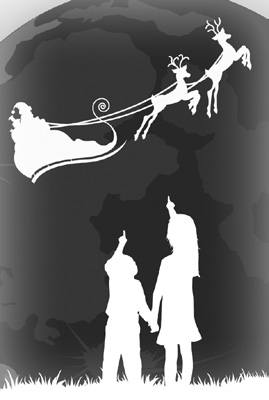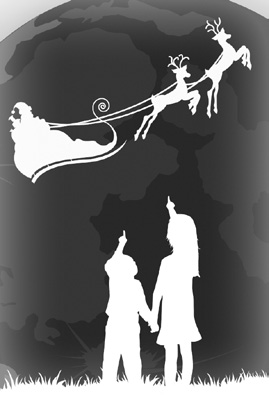Santa's Newest Reindeer (11 page)
Read Santa's Newest Reindeer Online
Authors: Denis Trom
“What does it say?” everyone demanded, crowding closer.
“Basically it says that they . . .” he started, but was interrupted by Peg grabbing his arm and shaking it.
“No! No! Read it word for word!” they demanded in unison.
Bill sighed and read the note: “Mom, Dad, Grams, and
Gramps: Do not worry about us. We are OK. Ellie and I are
going to the North Pole, to see if Santa Claus will help us
restore Christmas and New Year’s celebration in the Valley. We
will be home in time for Christmas Eve. We’ve got four days.
You can try to call us on Ellie’s cell phone. We have money and
snacks. Don’t worry. We love you. Will/Ellie XXXXOOOO.”
: 82
:
s a n ta' s n e w e s t r e i n Deer
“Did anybody hear anything last night?” asked Gramps.
They shook their heads and shrugged their shoulders.
“I hope they took warm clothes. An arctic cold front is fore-
casted, and the wind is supposed to blow all week,” Grams said.
“How are they going to travel? I suppose they called Santa
and he agreed to give them a ride,” humored Gramps, trying
to lessen their concern.
“The snowmobile and cargo snow sled is packed with the
stuff they planned on taking. I didn’t see any clothes or food,”
reported Bill, returning from the garage. “There must have
been a ruckus of some sort. Some of the gardening tools were
strewn on the floor, and I found a small smear of blood at the
front of the rig.”
“Peg, call the police,” demanded Grams, handing over the
telephone.
With a shaky hand, Peg grabbed the phone and rushed into
the living room.
“We need to go door to door and organize a search party.
With blood in the garage, who knows what has happened to
them. My goodness, what if . . .” Gram’s words ceased as Gramps
put his arms around her.
“They’ll be just fine. They’re probably over at the neighbors,
Marco and Bonnie. Ellie and Will often run over to Marco
and Bonnie’s house in the morning to walk to school with their
children. Sometimes kids don’t always tell their parents where
they’re going or when they’ll be home,” suggested Gramps in
a wishful tone, not letting his eyes betray his real concerns.
Peg rushed back into the room, her face pale. “The police
have sent out an all-points bulletin with the kids’ descriptions.
: 83
:
De n is t rom
Thank goodness the school provided the twins’ complete per-
sonal data sheets, including their pictures,” offered Peg with a
sigh of relief.
“They’ll keep us informed. You stay here in case the kids
call or we hear something from the authorities,” encouraged
Bill as he and Gramps donned their winter coats and headed
toward the door.
“We are going to organize a neighborhood search party.
Call us on our cell phones with any news. Don’t worry. We’l
be back soon.”
Peg and Grams followed the two men to the door, locking
it after them, and watched as the human snowmen, flashlights
illuminating their progress, baby-stepped through deepening
snowdrifts that blanketed the driveway. The snow had crusted.
As soon as they stepped on the top layer, it broke under their
weight. Just like their pronounced footprints rapidly disap-
peared, so did the men’s physical outlines.
“What was that?” exclaimed Gramps, pointing skyward to
a streaking flash of fire and sparks. Bill looked upward, but the illumination disappeared before he could locate it.
“Oh, I suspect it was a shooting star,” he mused. “There are
many of them this time of the year. Maybe it’s an elf helping
Santa deliver his Christmas presents,” chuckled Bill, slapping
Gramps on the back. They both laughed.
“Have you been a good boy, Bill?”
“I’m not answering that one,” quipped Bill as they con-
tinued on.
Arriving at the juncture where the driveway and the street
met, they both noticed multiple footprints and small, round
: 84
:
s a n ta' s n e w e s t r e i n Deer
droppings amid what resembled animal tracks. Although drift-
ing snow had compromised the area, Gramps discovered the
remnants of two deeply carved parallel tracks directly behind
the compressions. They studied the findings. It was as if two
light bulbs switched on inside their heads. They searched the
starry sky, hoping to identify the fiery star Gramps saw earlier, but they couldn’t find it.
“You don’t think . . . nah, it couldn’t be,” jested Bill with a
deadpan look.
“I don’t think so, but you gotta believe. That’s what you always
tell Ellie and Will,” reminded Gramps, poking fun at Bill.
Their shivering was due in part to the cold arctic wind pen-
etrating their layered winter garb but also from the chilling
thoughts of what or who left the unexplainable evidence close
to the driveway. They walked toward Marco and Bonnie’s house.
Neither one was willing to admit that there might be something
to this Santa Claus myth. Making sure that the other was not
watching, both quickly stole one more glance toward the sky.
In that second, the men each returned to their own childhoods.
After all,
if you don
’
t believe, you aren
’
t going to receive!
: 85
:

ThirTeen
Grams and Mom returned to the kitchen, awaiting any news
on the twins’ whereabouts. They busied themselves with idle
chat, checking text messages and e-mails. They tried watching
television and listening to the radio, but neither was on the air.
Each took turns watching out the window and returning to her
chair. The blizzard precluded seeing anything, but nervousness
forced them to check outside every few minutes. The arctic
clipper was gaining strength. Its increasing velocity shook the
storm windows, driving snow dust between them and the main
window. Doors rattled, as if someone or something was trying
to unlawfully enter. Wind shears created high-pitched whistles,
gusting between the house and the garage.
“This weather is not fit for man nor beast to be out in, let
alone two kids,” complained Grams, verbalizing her frustration
and thinly veiling her inner fears.
“They’ll be just fine. Soon they’ll be walking up the driveway
with Dad and Gramps,” countered Peg. “The bond between our
twins and us is stronger than any raging blizzard.” Although
: 87
:
De n is t rom
they nodded in agreement, their nervous smiles betrayed their
true feelings.
A crashing sound caused them to rush to the window. A
garbage can chased its lid across the backyard and smashed
into the storage shed.
“Glad it wasn’t the old cottonwood tree. If that falls, it could
land on the house and cause considerable damage.” No more
had the two women returned to the kitchen table than the lights
flickered and the house went dark. Both radio and televisions,
once crackling with static, went totally silent.
“Do you know where the flashlights are?” asked Grams.
“Bill and Gramps took them, but we have candles and kero-
sene lamps,” reassured Peg as she cautiously navigated toward
the pantry. She luckily found the two kerosene lamps and
returned to the table. The lamps sufficiently lit the room so
they could see each other.
“Good. Never thought we would be using these, but Bill
said it could happen anytime in this country,” related Peg, as
she filled and set three large vessels of water near the sink. “We just might need these if the pipes freeze and we have no water.
“Bill promised that he was going to get the portable generator
fixed first thing this past spring, but I guess he got busy with
something else and never got around to doing the repairs. Just
last week he mentioned that taking it to the repair shop was
number one on his list. I guess he lost the list,” lamented Peg,
searching the cupboards for a box of wooden matches.
“This reminds me of the old days when kerosene lamps and
candles were all we had to light our house. We did everything
by lamplight—reading, eating, sewing—everything,” reminisced
: 88
:
s a n ta' s n e w e s t r e i n Deer
Grams. She placed the steam kettle on the camp stove’s lit gas
burner.
Peg went to the front room and placed two more logs onto
the dying flames, which sprang to new life. She looked out the
sunroom’s bay window. It looked desolate. The snowfall had
ceased, but the wind continued to howl. The landscape reminded
Peg of the old days when black and white were the only TV
color options. The moon provided the contrast between light
and dark structures. Occasionally, a swaying tree branch scraped
the side of the house, interrupting the quiet still-life scenery.
“Grams, let’s go through the house and open the lower cup-
boards so the warm air circulates around the water pipes.”
Guided by lamplight, the two house sitters went about their
chores. Peg went upstairs while Grams scurried about the main
floor rooms. When Peg returned to the kitchen, Grams had
poured two cups of hot tea and extinguished the flame.
“Let’s go sit by the fireplace and enjoy our tea,” suggested
Grams.
The fire offered comfort from the colder rooms and a cozy
place to wrap up in the homemade patchwork quilts Grams
had made last spring. Sparks snapped from the logs as flames
licked back and forth. Small smoke puffs curled from beneath
the iron grating, ascending like twisting ribbons and disappear-
ing. Orange, red, and yellow embers lulled the two tea sippers
into a trance accompanied by the grandfather clock’s constant,
monotonous
tick-tock, tick-tock
.
: 89
:

FourTeen
Jeepers turned in his seat and craned his head back at the twins.
They were still on board, alive and alert. All he could see was
their eyes, noses, and their frosty breath, streaming from under
their comforter.
“Enjoying your ride so far?” he yelled, knowing that the ice
had sealed their lips and rendered them incapable of answering
even if they wanted.
“Before we get to the North Pole, I am going to tell you a
few things about astronomy. We are not headed to North Pole,
Alaska. We are headed to the Arctic Circle where Santa Claus
lives and works. The trip will take us at least a day’s travel. We’l spend about two days at Santa’s Village. That will give us one
day to take you home in time for Christmas. We’ll be guided
by star patterns called constellations.
“Many constellations in the north were named in ancient
times by Greeks and Romans. Since the southern groupings
could not be seen from the north, they were named by people
living in European countries. Astronomers—those who study
: 91
:
De n is t rom
stars—named the constellations after animals or mythological
figures. Ha, ha, ha! Ho, ho, ho! Oh what fun! Am I talking too
fast for you?” laughed the little man, bouncing on the driver’s
seat.
Ellie and Will were too cold to answer.
Jeepers continued, “There are eighty-eight recognized con-
stellations, and they cover the entire sky that is visible from